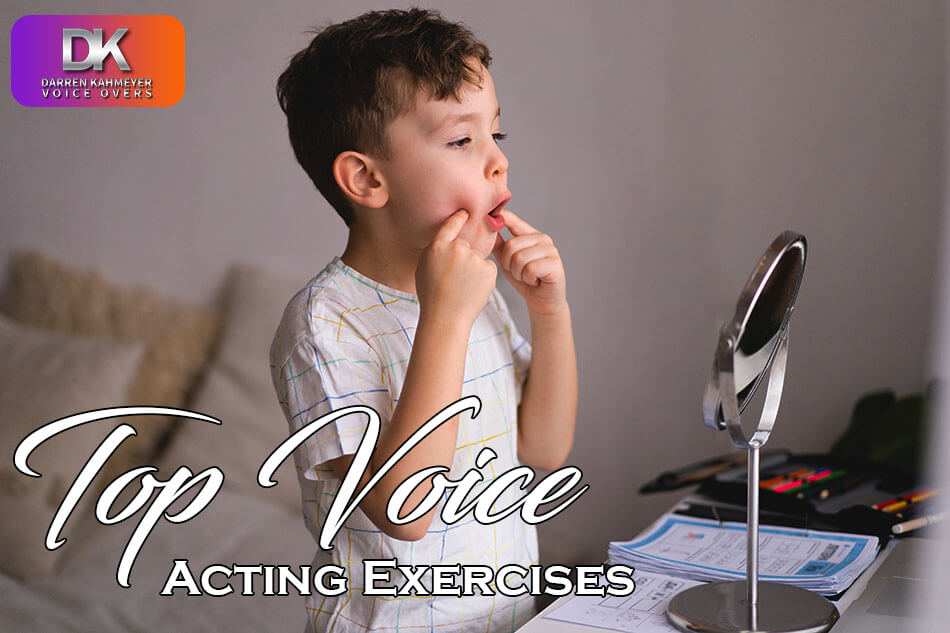Improve your skill with Voice Acting Exercises: Have you seen athletes sweating it out at the gym or the court/track before they go out to play the actual game? Or mountaineers making several smaller ascents before their actual intended peak ascent? They do this as a kind of exercise to make themselves fully fit before the actual event.
Voice artists or voice actors are no exceptions. Their job requires them to be at the top of their vocal ability when they stand in front of the microphone. So, voice acting exercises or vocal warm-ups are critically important for them to get their voice in shape.
Just like in any other profession, there’s competition here as well. So, as a voice actor, you would feel the urge to stay ahead of your competitors. And one sure-shot way of doing that is by building up – and strengthening – your vocal muscles.
Why Should You Go for Vocal Warm-ups
As the vocal cords are toned more & more, the voice acting capabilities become more versatile. And ongoing vocal warm-up exercises also make your vocal cords stronger, thereby lessening the chances of injury to them. It helps you get prepared for those long voice acting sessions.
The idea is to feel relaxed when you go behind the microphone. If you feel relaxed, then it would reflect on your vocal performance. And the opposite is also true.
Benefits of Voice Acting Exercises
Needless to say, voice acting exercises come with a slew of benefits for you. Some of them are:
- Your vocal folds can loosen up
- Help you to strengthen your vocal chords
- This would facilitate conducting exercises that would improve vocal range, articulation, and diction
And the end result? Using your voice at its top performing level for an extended period without facing any challenge.
While you might have come across many suggestions on social media or from friends regarding such exercises, let us take you through the top 7 voice acting exercises, as below.
Top 7 Voice Acting Exercises for Voice Actors
Even as a voice actor, you would need to make different types of facial expressions. So, along with stretching the rest of your body, also stretch your facial muscles. Squeeze up your mouth and make some facial movements as if you are taking a big yawn. Repeat this exercise several times. This will build your facial muscles.
An exercise that also makes you feel happy & relaxed. Start humming a tune whose frequency is something that you can adopt without any effort. Then go for frequencies both higher and lower than the present one. This exercises your vocal cords and makes them more flexible. More intensive exercises can follow after this one.
Take a deep breath and raise your arms. Then, release your breath and lean towards the left. After a few seconds, repeat the exercise – this time leaning towards your right as you exhale.
The second part of this would involve stretching your body towards the front. Stand by stretching your legs slightly apart. Raise your hands and then bend towards the front. After a few seconds, come back to the standing position. This entire exercise of stretching would make your body feel relaxed and fill your lungs with air.
These are among the most critical exercises to increase both the range of your vocal cords and also your energy. There are several ways to do this. Some of the effective ones are:
- Take a straw in your mouth & breathe into it. This helps you to focus fully into the breathing activity, without moving your body or even facial muscles.
- Inhale for as long as you can, without putting yourself in discomfort. Then exhale, but not silently. Make a hissing sound like a snake. With every intake of breath, try to extend the time of both inhaling & the hissing exhaling.
The age-old “she sells seashells on the seashore” still works fine as a tongue twister. Being fluent with tongue twisters mean your articulation is perfect. And that’s one of the basic skills that you need as a voice artist. Make up your own tongue twisters or source them from friends & family/the internet. But, take things easy & don’t overstress yourself.
Choose any song/musical piece you like. Sing it, but not in its usual scale. Raise your voice to a high pitch, bring it down gently to the normal level, and then go down to a much lower scale. Repeat this several times. This increases the flexibility of your vocal cords while also making your voice muscles stronger.
-
Sleep Well the Night Before
This might be a tad surprising for many. But after all those vocal exercises, it’s critical to get a good night’s sleep before the recording day. Ideally, you should look to get an eight-hour sleep. A good sleep makes you feel relaxed, provides the much-needed rest to all your body parts (including throat) – and this relaxed body will positively impact your performance as a voice actor.
